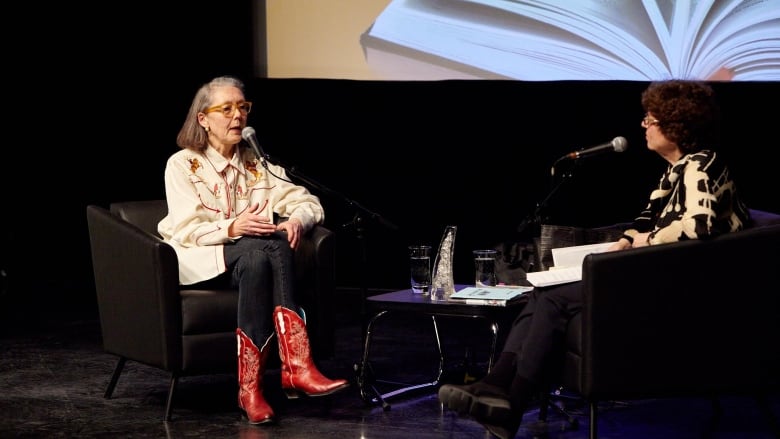Anne Carson on writing from the margins of her mind
Norma Jeane Baker of Troy won the 2020 Governor General's Literary Award for poetry


"You can lie in writing," Anne Carson said on stage at the Blue Metropolis Festival. "People lie all the time." Anne Carson may be lying, but if she is, it's working for her. The author of Autobiography of Red, Antigonick and Red Doc>, Anne Carson is often hailed as an original and has won numerous awards and accolades, including a Guggenheim, a Lannan Foundation fellowship and a MacArthur "genius grant." With her 2001 book, The Beauty of the Husband: A Fictional Essay in 29 Tangos, she became the first woman to receive England's T.S. Eliot Prize for Poetry. Carson also won Canada's inaugural Griffin Prize in 2001 for her collection Men in the Off Hours.
Her latest poetry collection, Norma Jeane Baker of Troy, which won the 2020 Governor General's Literary Award for poetry.
Eleanor Wachtel spoke to Carson about the craft of writing and translating on stage at Montreal's Blue Metropolis, where Carson was awarded the festival's Grand Prize.

On finding the truth in translation
"Looking at the gaps between the words as you move from one language to another, and the way meaning disappears into the gaps — that experience is what I value most about translation. We operate all the time with language as if it says what we mean. It never does, but you don't realize the flaccidity of that until you are actually trying to make one thing in one language into another language. It's like being on a surface with a lot of cracks in it and looking down through the cracks to something like another world down there that you can almost see, almost express, but not quite. It's frustrating in the sense that there's an ideal understanding down there that's not available but, on the other hand, it doubles reality because we don't live in that ideal world, we live up here, and yet you can glimpse down through the cracks to that other thing."
On discovering her father's journals
"He, among other things, wrote down words that he had to look up in the dictionary, and he would write down the definition. They were all words that I knew already and it seemed, suddenly, really sad to know more words than my dad. Your dad should know way more words than you, always. That unbalance of our relations came out of it, and then I didn't know what to do with it. It was weird, the realization of being older than your own parents. That comes to everybody at a certain point. You take some photographs or some object of theirs and realize you are now older than they were in that photograph and suddenly everything seems inside out.
"The nature of the person is printed in the writing, the nature of the person comes out of the writing in a way that it doesn't from anything else that you know about them. But I did notice, looking at it, that my handwriting now grows more and more like his handwriting in the notebook. And we're completely different people, so I don't know what that means. But it's a shock to see your own handwriting changing into somebody else's."
Writing poems is like making art
"Making a poem is making an object. I always thought of them more as drawings than as texts, but drawings that are also physically enterable through the fact of language. It was another way to think of a book, an object that is as visually real as it is textually real."
The sound of silence
"The thing about silence is that if you're noticing it, it's not useful to you. You've got to be thinking — absorbed in a line of thought that the silence has made possible — but you're not dwelling on the fact that you're in silence because then you're not thinking about the thought, you're thinking about the silence.
"In solitude, there are these margins, these gutters, around the day and around whatever I am doing. It's those gutters that those thoughts come out of that makes writing. I have a sense of the margins available to the day, when I'm alone, to the hour, to my mind. There are margins of my mind that fold in for social purposes."
Anne Carson's comments have been edited for length and clarity.
